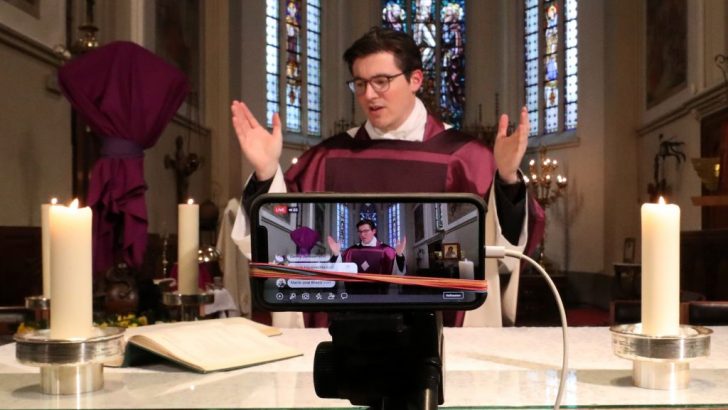The authorities believe that Mass is less important than going to a gym or hairdresser and this has to be rejected, writes David Quinn
In Derry, you can still go to Mass if you want, but across the border in Letterkenny you cannot. How can this be? The answer is that the North’s Executive and public health authorities have taken a very different attitude to public worship than their equivalents in the South.
In the North, they have judged that public worship is so important there must be a cast-iron public health reason to stop it altogether. They know one does not exist.
In the Republic, we stopped public worship again under level 3 restrictions, which are at the mid-point of the five possible levels of restriction. We were absolutely alone in Europe in doing this.
I attended one of the National Public Health Emergency Team (NPHET) press conferences at the end of September when a number of counties including Dublin had been pushed into level 3 and public worship stopped.
At this level, outdoor dining was still permitted, you could go a gym, a barber or a hairdresser, and go into any shop you liked. But you could not go to Mass.
No direct evidence
I asked Dr Ronan Glynn, the acting Chief Medical Officer why this was so. His answer was revealing. He said public worship is considered “less important” in the context of a pandemic. Less important, in other words, than going to a gym or hairdresser.
He could point to no direct evidence that it was risky to go to Mass.
Other European countries are now stopping public worship again in response to Covid-19, among them England and France and Belgium. But unlike the Republic of Ireland, those three countries did not stop public worship in mid-level restrictions as we did. They have only done so again under their highest level of restrictions and because they believe Covid-19 is going out of control once more within their borders.
However, at the time of writing, a big majority of European countries are still permitting public worship, even as the infection rate among their populations climb.
In Italy, for example, you can still go to Mass. It is the same in Spain and Portugal, Austria and Germany, the Netherlands, plus all of the Scandinavian countries.
The situation is extremely fluid, and new and varied restrictions are being imposed all the time, but all, or almost all of Central and Eastern Europe seems to be allowing public worship to continue as well.
Obviously, all countries have imposed limits on the number who can attend public worship at any one time, and all require strong hygiene measures.
Right across Europe, these are and were being extremely well adhered to. There have only been isolated examples of infection outbreaks associated with public worship. The overwhelming majority of churches and other places of worship have been extremely safe and deserve huge praise for their efforts.
Last week, the four archbishops met with Taoiseach, Micheál Martin, to discuss their concerns about the ban on public worship.
We don’t know exactly what was discussed. For example, did they raise concerns that the law in Ireland could now result in the prosecution of any cleric who organises public worship, the first time such a law has existed since Penal Times?
Unlike in the Republic, the Austrian authorities do not consider public worship to be ‘less important’. They think it is very important”
The Government denies this interpretation is correct, but the wording of the law suggests otherwise to some, including independent TD and lawyer, Michael McNamara.
Following the meeting, the four archbishops won no commitment from the Government that public worship would be permitted again under level 3, never mind the present level 5.
This holds out the prospect that when we come out of level 5 and go back down to level 3 or 4, we still will not be able to go to Mass, and it could be well into next year before we can attend again.
Contrast the outcome of this meeting with a similar one in Austria, where infection levels are currently higher than here. The Austrian government has introduced new restrictions, but is determined to be proportionate in its response. Therefore, it has not stopped public worship again as it did during the first lockdown in the spring.
The Austrian Minister for Culture and Religious Communities met with religious leaders last week ahead of the imposition of new restrictions and they agreed that from now on worshippers would have to remain at least 1.5 metres apart.
Challenging time
After the meeting, the Austrian minister in question, Susanne Raab, said: “It is important that joint practice of religion in the form of public Church services will continue to be possible, because they give the believers a lot of support in this challenging time. The Churches and religious communities are doing everything to prevent the coronavirus from spreading further and are therefore taking further measures.”
As we can see, unlike in the Republic, the Austrian authorities do not consider public worship to be “less important”. They think it is very important.
Meanwhile, in countries like England and France where public worship has stopped again, bishops are fighting back hard.
In England, Cardinal Vincent Nichols and Archbishop of Liverpool Malcolm McMahon issued a statement demanding the government publish evidence explaining how public worship has contributed to the spread of the virus.
The Bishop of Toulon in France, Dominque Rey, said freedom of worship was “non-negotiable”.
The Republicans, France’s main opposition party and partner of Fine Gael in the European Parliament, also called for public worship to be allowed to continue.
In Ireland, by contrast, religion is now regarded with either hostility or indifference by almost all of our political establishment. It is “less important”, as Dr Ronan Glynn put it.
We must follow the example of Churches elsewhere and fight back.


 David Quinn
David Quinn
